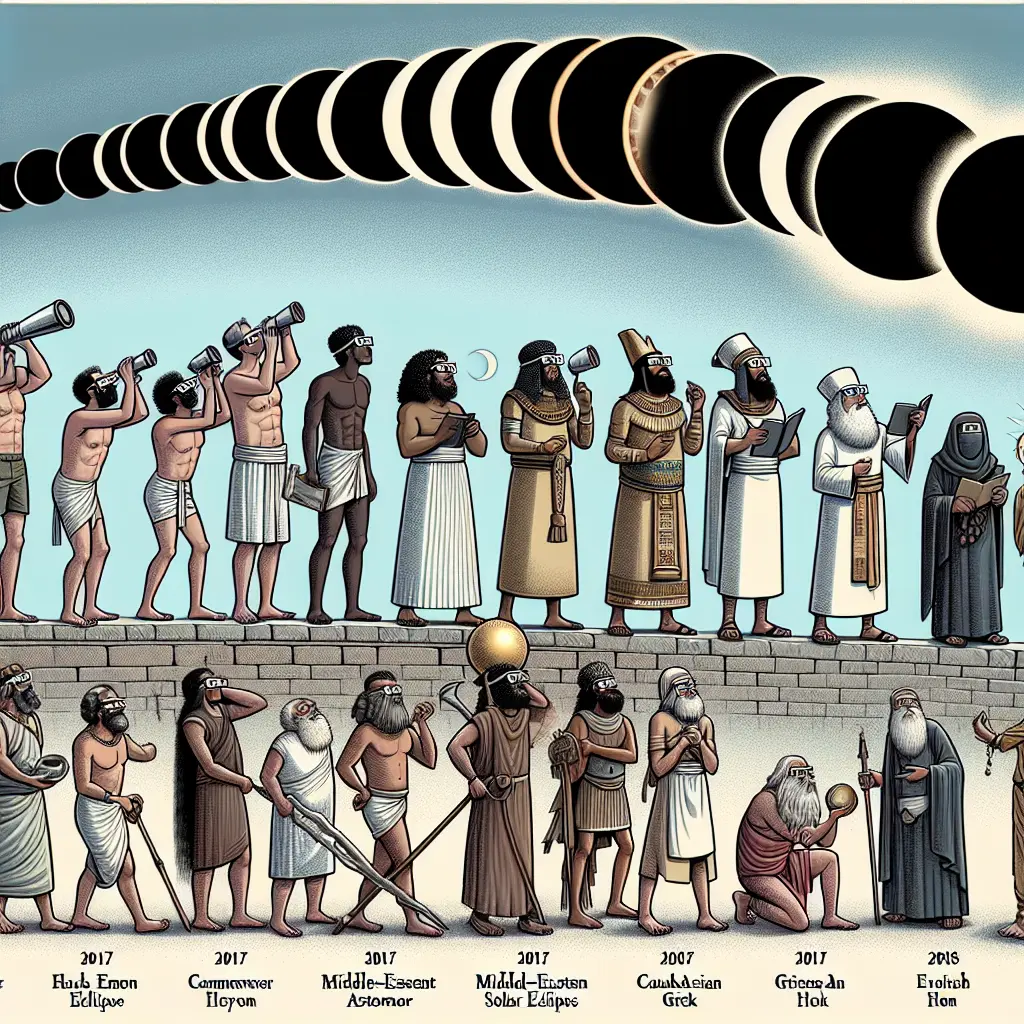
Throughout history, solar eclipses have captivated the imaginations of people across various cultures, sparking awe, fear, and curiosity. From ancient myths to scientific breakthroughs, the historical significance of solar eclipses is profound, influencing not only the course of science but also the cultural fabric of civilizations.
The Cultural and Religious Impact
Ancient civilizations often interpreted solar eclipses through the lens of their religious and cultural beliefs. In ancient China, for example, solar eclipses were believed to be a dragon consuming the Sun—a sign of impending doom or a call for the emperor to correct his faults. This belief in celestial omens was not confined to China; similar interpretations were found in ancient Babylonian texts. Recently, The British Museum deciphered 4,000-year-old Babylonian texts revealing that lunar eclipses were considered harbingers of disasters (source needed). This underscores the widespread cultural impact of solar eclipses and their role in shaping ancient societies' understanding of the cosmos.
Solar Eclipses in Mythology
Mythology from various cultures also reflects the deep impression left by solar eclipses. In Viking lore, the eclipse was thought to be caused by wolves running across the sky attempting to devour the sun. Similarly, in Vietnamese mythology, a frog or toad was believed to be swallowing the Sun during an eclipse. These stories, passed down through generations, highlight the solar eclipse's role in the cultural identity and spiritual life of civilizations.
Advancements in Science
The curiosity about solar eclipses transcended cultural boundaries and laid down a path for scientific inquiry. Historically significant events like the solar eclipse of May 29, 1919, helped prove Einstein’s theory of general relativity by demonstrating the bending of light around the sun. This pivotal moment in history not only marked a major advancement in astrophysics but also highlighted the role of solar eclipses in scientific discovery.
Recent scientific projects have continued to emphasize the importance of solar eclipses in understanding celestial phenomena. NASA’s Parker Solar Probe, for example, provided fresh clues about the decades-old mystery surrounding the sun’s magnetic fields and solar winds (source needed). Moreover, innovative techniques in photography and citizen science projects like those encouraged by NASA show that public engagement with solar eclipses can contribute to important scientific discoveries.
Recreating a Solar Eclipse
Understanding solar eclipses has also led to educational advancements whereby one can recreate a solar eclipse using simple materials at home. This not only demystifies how eclipses occur but also serves as an excellent educational tool for students and astronomy enthusiasts alike.
Solar Eclipses and Modern Day Viewing
Viewing a solar eclipse remains a thrilling experience today. With tools like eclipse glasses and pinhole cameras, enthusiasts can safely observe these celestial events. Moreover, events like Holland America’s special eclipse-viewing cruise offer unique viewing experiences for eclipse chasers (source needed). The anticipation around such events is comparable to the excitement generated by other astronomical phenomena like the aurora borealis. Recent reports indicate that conditions are favorable for viewing the northern lights across several U.S. states tonight and tomorrow, providing another splendid opportunity for skywatchers (source needed).
Photography and Artistic Representations
The blend of science and art in capturing images of solar eclipses has also gained popularity. An astrophotographer recently created a unique image of the sun by blending scientific techniques with artistic vision (source needed). Furthermore, stories from photographers like those who shot the recent solar eclipse on film using a Hasselblad 500 C/M camera highlight the ongoing fascination with these celestial events (source needed).
Looking Forward: The 2024 Total Solar Eclipse
Looking ahead, the total solar eclipse of 2024 is already generating buzz. Such events not only offer a chance for communal experiences but also serve as moments of reflection on our place within the universe.
In conclusion, from shaping ancient beliefs and cultural narratives to advancing modern science and fostering global community experiences, solar eclipses hold a unique place in human history. They remind us of our continual quest for understanding and our intrinsic connection to the greater cosmos.
As we anticipate future eclipses, let's embrace these celestial phenomena not just as beautiful spectacles but as profound symbols of human curiosity and interconnectedness.
Simon Gregory